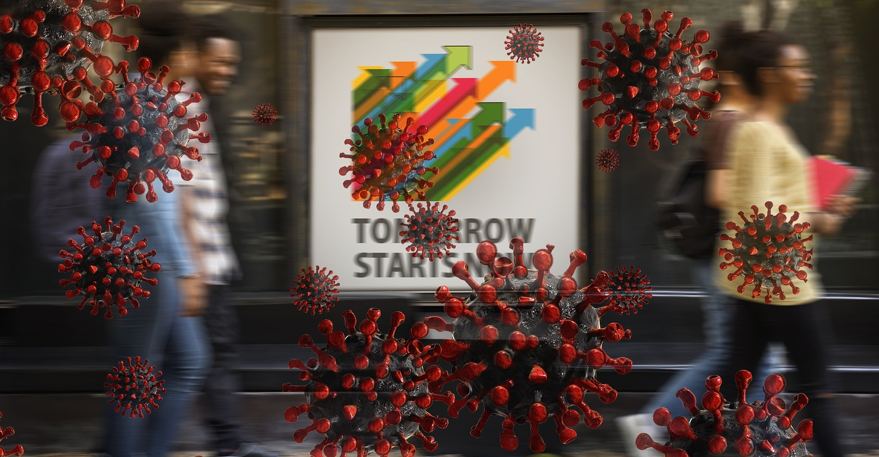News release
From:
COVID-19 likely to worsen inequalities for at least five years without renewed global cooperation, warns International Science Council
New report maps out scenarios for the year 2027 and calls for UN to establish a Science Advisory Board to inform future pandemic response.
May 17, 2022, GENEVA – COVID-19 will continue to increase inequalities and vulnerability to future crises until at least 2027 without a renewal of global cooperation, according to new analysis by the International Science Council (ISC).
Unprecedented and Unfinished – COVID-19 and Implications for National and Global Policy calls for the UN to establish a new Science Advisory Board to help curtail the impact of the pandemic and better coordinate across sectors and the UN system for future global emergencies.
The report considers three potential scenarios through the year 2027, primarily determined by the evolution of the virus, and the global uptake and coverage of effective vaccines. In the most likely scenario, COVID-19 will have worsened inequalities in health, economics, development, science and technology, and society. COVID-19 will have become an endemic disease worldwide, and low-income states risk health system collapse and growing food insecurity. Mental health concerns will grow even further.
“We must not take a narrow view of the pandemic or minimize its impacts beyond public health, otherwise inequities will grow, and the broader consequences will be felt in every society in every country,” said Peter Gluckman, President, International Science Council (ISC), underlining the need for a more holistic, multilateral approach to crises.
“To ensure a resilient and more equitable future, we must find ways that embolden effective international collaboration in addressing global threats. Additionally, the report aims to assist all governments in exploring appropriate responses in the broad interests of all their citizens and societies.”
In a more pessimistic scenario, the world faces high levels of harm to social wellbeing – with long-term school closures, unemployment, and increased gender-based violence. Growing nationalism and polarization will inhibit cooperation on global vaccinations and trade and give rise to conflict. Despite climate change’s intensification, many countries will reverse environmental reforms in attempts to overcome COVID-19’s economic impact under this scenario.
“The COVID-19 pandemic has demonstrated the value of international scientific cooperation, even in the face of cascading environmental risks and geopolitical tensions,” said Mami Mizutori, Special Representative of the United Nations Secretary-General for Disaster Risk Reduction.
“We must renew efforts to build a multilateral system that addresses inequalities while preparing us for the next crisis. Whether it be another pandemic, climate change, or conflict, we have the chance to learn from the last two years. If not, the Sustainable Development Goals will slip out of reach.”
In particular, the ISC report underlines the need to examine these impacts as interconnected and cumulative. Where one policy dimension falls off track, another can follow.
For instance, lost education, which was one of the spheres worst hit by the pandemic, could well have wider impacts until the end of the century, resulting in as much as $17 trillion in reduced earnings over the lifetime of an entire generation of students and aggravating growing concerns about mental health.
The economic impact of the pandemic has already been felt. In 2020, more than eight per cent of working hours were lost, equivalent to 255 million full-time jobs. This has also contributed to a mental health crisis with a recent study covering 204 countries and territories, estimating that the COVID-19 pandemic has resulted in an additional 53.2 million cases of major depressive disorder and an additional 76.2 million cases of anxiety disorder globally.
Furthermore, the report highlights a need to address the challenges of disinformation, and to strengthen diverse scientific advice systems to increase trust in science, thereby protecting societies from acute health risks and the breakdown of social cohesion.
While the pandemic has demonstrated the value of mobilizing the scientific community to work closely with governments, much more needs to be done - particularly by policymakers - to avoid the worst-case scenarios in the future, especially for low- and middle-income countries, the authors find. National and global policy considerations should address widening global inequalities not only in vaccine distribution but also related to inclusive governance, economic recovery, and the digital and educational divide.
The report concluded that the future course of the pandemic, and its consequences that extend well beyond the health sector, will depend on policy decisions taken today, which have the potential to either shorten or prolong the crisis, and mitigate or aggravate its impacts.
Ends



 New Zealand; International
New Zealand; International



